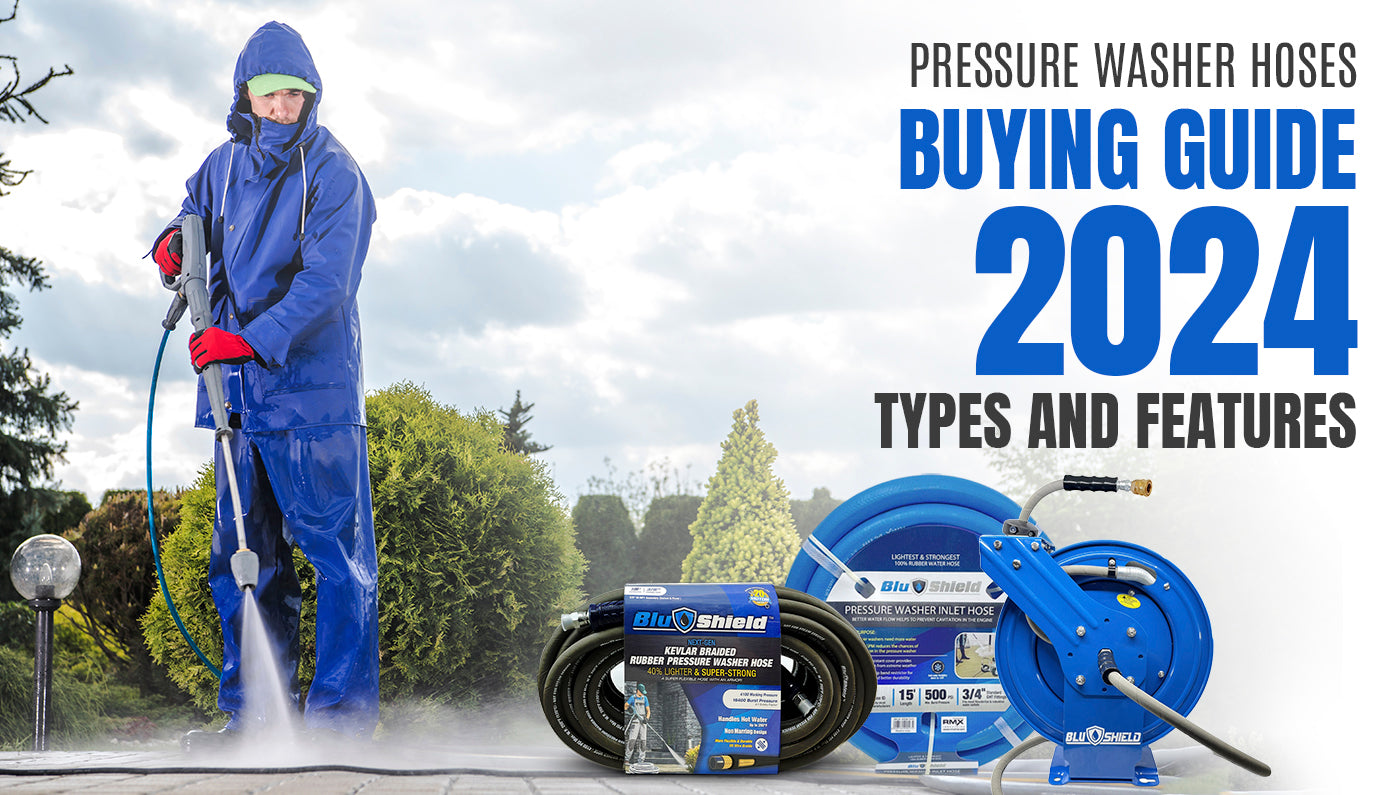Pressure Washer Hoses Buying Guide 2024 | Types and Features
A pressure washer hose is a powerful tool that uses high-pressure water sprays to clean various surfaces. And one critical component of a pressure washer setup is the hose.
While a pressure washer hose may seem like a simple accessory to have, it plays an important role in determining the efficiency, safety, and effectiveness of the cleaning process. This is why selecting the right pressure washer hose for various cleaning tasks is crucial.
In this blog, we have laid out a complete guide for selecting the right pressure washer hose. So, let’s dive right in.
Understanding Pressure Washer Hoses
A pressure washer hose is an important part of your pressure washing equipment. They help transport the water from the pressure washing machine to the outlet and finally onto the surface you use it on.

These hoses are designed to handle the high pressure generated by the machine, which ensures the water flows with a jet-like pressure and effectively cleans surfaces. Moreover, a well-designed pressure washer hose ensures safe operation by maintaining a consistent flow of water at the desired pressure.
Types of Pressure Washer Hoses
Pressure washer hoses are built with different types of materials, each of which has its own unique properties and suitability for specific applications.
Below is a discussion on the different types of pressure washer hoses available based on their materials.

1.Rubber hoses
Rubber pressure washing hoses are made from natural or synthetic rubber. They are known for their robustness and resistance to abrasions, cuts, and UV rays. They are also flexible, which makes them easy to handle.
Moreover, they are suitable for both hot and cold water applications, making them the most common choice for pressure washer hoses. They are used for heavy-duty tasks, commercial applications, and situations where the hose might be subjected to rough handling or abrasions.
Pros
- Offers excellent resistance to abrasions, cuts, and chemicals
- They are flexible, even in cold temperatures
- Can handle a wide range of temperatures
Cons
- They are heavy and can be difficult to use for some users
- They are expensive, which can be an issue for budget-conscious buyers
2. PVC hoses
These hoses are lighter than rubber hoses but not as flexible. They are also cheaper but cannot withstand extreme temperatures as they have the risk of melting or deforming. They are best suited for light to medium-duty tasks, such as home use, car washing, or general cleaning. They are also popular for cold water applications as they are affordable.
Pros
- They are cheaper than hoses of other materials
- They are easy to handle and transport due to their lighter weight
Cons
- They have temperature limitations
- They don’t offer the same level of flexibility as rubber hoses
- They are generally less durable than rubber or polyurethane
3. Polyurethane hoses
These hoses are made from polyurethane, which is a synthetic polymer. They offer excellent resistance to abrasions, cuts, and chemicals. Moreover, they are flexible and can also handle certain temperature extremes. They are ideal for tasks that require a balance between flexibility and durability, such as professional cleaning tasks, construction sites, or industrial applications.
Pros
- They offer excellent resistance to abrasions, cuts, and chemicals.
- They are flexible even in cold temperatures
- They can handle a wide range of temperatures
Cons
- They are more expensive than PVC hoses.
- They are generally heavier than PVC hoses.
- These hoses can still kink under certain conditions if not handled properly.
Pressure Washing Hose Length and Diameter
Choosing the right length and diameter of a pressure washer hose is crucial for optimal performance. The length and diameter directly influence water pressure and flow, which in turn affects the cleaning efficiency of your hose.
Below is a guide to choosing the right length and diameter of your hose for specific cleaning needs.
Understanding hose diameter
The hose diameter determines the volume of water that can flow through it. A larger hose diameter allows for a higher flow rate, but it may reduce the water pressure.
Most pressure washer hoses come in diameters of ¼ inch, 5/16 inch and even 3/8 inch.
Choosing hose length
Determine the typical distance between your pressure washer and the area you'll be cleaning. For example, if you clean a large driveway, you may need a hose with a larger length. On the other hand, cleaning your car may require a shorter hose length.
Longer hoses provide more reach but can reduce water pressure due to friction and flow resistance. Thus, using a hose that's too long for your pressure washer can result in reduced cleaning efficiency due to insufficient pressure.
Moreover, a longer hose will decrease the flow rate because the capacity of your pressure washer is not sufficient enough to maintain adequate pressure throughout the length of the hose.
Guidelines for specific cleaning needs
Household tasks like car washing or even patio cleaning will need lengths of 25-50 feet and a diameter of ¼ inch.
However, medium to heavy-duty tasks like large driveways and commercial spaces will need lengths of 100 feet or more and a diameter of 5/16 inch or 3/8 inch.
Connection Types and Compatibility
Pressure washer connections and fittings play a vital role in ensuring a secure and efficient setup. The most common types include threaded connections (often with male and female ends), quick-connect couplers (which allow for swift attachment and detachment), and bayonet-style fittings
To ensure compatibility with different pressure washers, always check the machine's specifications and choose fittings that match its threading size and type. Using adapters or couplers can help bridge any mismatches. However, it's important to ensure a tight seal to prevent leaks and maintain optimal water pressure in the hose.
Features to Look Out For In A Pressure washer Hose
When choosing your pressure washing hose, look out for these key features listed below.

1. Kink resistance
Opt for hoses designed with kink-resistant materials or structures. A kink-resistant hose ensures a continuous water flow and reduces interruptions during cleaning.
2. Durability
Look for hoses constructed from high-quality materials like reinforced rubber, polyurethane, or PVC with added layers for enhanced strength.
3. Temperature range
Consider the temperature range the hose can handle, especially if you'll be using hot water pressure washers. Choose hoses that are designed to withstand high temperatures to prevent melting or deformation. BluHose hoses supports
4. Pressure rating
Check the hose's pressure rating to ensure it can handle the pressure output of your pressure washer.
Maintenance and Care Tips
If you want to extend the lifespan of your pressure washer hose or prolong its lifespan, you need to maintain and store it properly.
Below are some tips to maintain and care for your pressure washer hoses.
1. Regular inspection
Check the hose regularly for signs of wear, cuts, or abrasions. Replace any damaged sections of the entire hose if necessary.
2. Avoid kinking
When using the hose, ensure it remains free of kinks, twists, or tangles. Kinking can weaken the hose and lead to premature failure.
3. Clean after every use
After each use, flush out any remaining water and debris from the hose. This prevents clogs and buildup, which can degrade the hose over time.
4. Store your hose properly
Store the hose in a cool, dry place away from direct sunlight and extreme temperatures. UV rays can degrade the hose material over time.
Safety Considerations
Safety is paramount when using pressure washers. Always use appropriate pressure settings and avoid directing the water jet at people or fragile objects.
Moreover, you should always wear safety goggles and protective clothing. If you are using chemicals inside your hose, then follow the manufacturer’s instructions and wear protective gear.
You should also ensure your hoses are in good condition and avoid electrical hazards when using them.
Latest Trends and Innovations for 2024
The future of the pressure washing industry looks bright, as companies are now manufacturing devices that are both eco-friendly and sustainable.
We may expect to see pressure washer hoses with automatic leak detection, advanced meters to determine water pressure and volume, and much more. Some hoses may come equipped with advanced filtration systems that filter out dirty water and pollutants as you spray them.
Some pressure washer hoses may also come equipped with AI that will prevent water wastage, ensure optimal flow and pressure, and even suggest cleaning techniques for various surfaces.
Final thoughts
Understanding the nitty gritty of garden hoses and choosing the right one for yourself is essential to have an efficient and easy cleaning experience. Investing in the right hose tailored to your needs and prioritizing regular upkeep can significantly enhance your gardening experience, ensuring efficiency, longevity, and sustainability.
Your search for quality, durable and efficient pressure washer hoses ends here with us.

